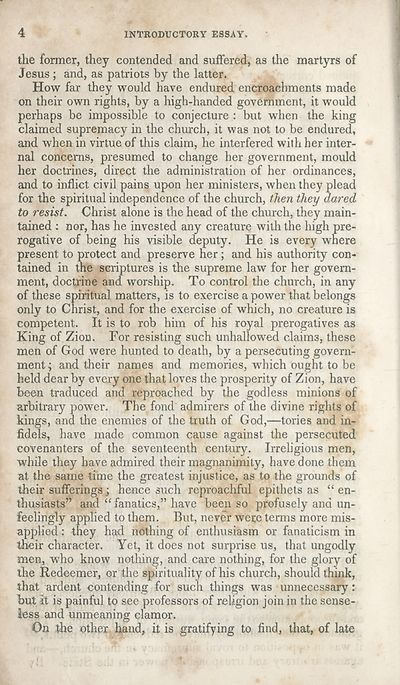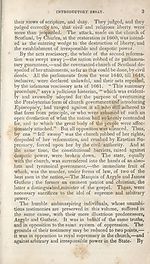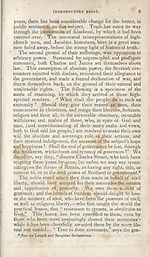Religion & morality > Cloud of witnesses, for the royal prerogatives of Jesus Christ, or, The last speeches and testimonies of those who suffered for the truth in Scotland, in the years 1681-1688, with an appendix, containing the Queensferry paper, Torwood excommunications, &c
(16)
Download files
Complete book:
Individual page:
Thumbnail gallery: Grid view | List view

4
INTRODUCTORY ESSAY.
the former, they contended and suffered, as the martyrs of
Jesus ; and, as patriots by the latter.
How far they would have endured encroachments made
on their own rights, by a high-handed government, it would
perhaps be impossible to conjecture : but when the king
claimed supremacy in the church, it was not to be endured,
and when in virtue of this claim, he interfered with her inter¬
nal concerns, presumed to change her government, mould
her doctrines, direct the administration of her ordinances,
and to inflict civil pains upon her ministers, when they plead
for the spiritual independence of the church, then they dared
to resist. Christ alone is the head of the church, they main¬
tained : nor, has he invested any creature with the high pre¬
rogative of being his visible deputy. He is every where
present to protect and preserve her; and his authority con¬
tained in the scriptures is the supreme law for her govern¬
ment, doctrine and worship. To control the church, in any
of these spiritual matters, is to exercise a power that belongs
only to Christ, and for the exercise of which, no creature is
competent. It is to rob him of his royal prerogatives as
King of Zion. For resisting such unhallowed claims, these
men of God were hunted to death, by a persecuting govern¬
ment ; and their names and memories, which ought to be
held dear by every one that loves the prosperity of Zion, have
been traduced and reproached by the godless minions of
arbitrary power. The fond admirers of the divine rights of
kings, and the enemies of the truth of God,—tories and in¬
fidels, have made common cause against the persecuted
covenanters of the seventeenth century. Irreligious men,
while they have admired their magnanimity, have done them
at the same time the greatest injustice, as to the grounds of
their sufferings; hence such reproachful epithets as “ en¬
thusiasts” and “ fanatics,” have been so profusely and un¬
feelingly applied to them. But, never wei;e terms more mis¬
applied: they had nothing of enthusiasm or fanaticism in
their character. Yet, it does not surprise us, that ungodly
men, who know nothing, and care nothing, for the glory of
the Redeemer, or the spirituality of his church, should think,
that ardent contending for such things was unnecessary:
hut it is painful to see professors of religion join in the sense¬
less and unmeaning clamor.
On the other hand, it is gratifying to find, that, of late
INTRODUCTORY ESSAY.
the former, they contended and suffered, as the martyrs of
Jesus ; and, as patriots by the latter.
How far they would have endured encroachments made
on their own rights, by a high-handed government, it would
perhaps be impossible to conjecture : but when the king
claimed supremacy in the church, it was not to be endured,
and when in virtue of this claim, he interfered with her inter¬
nal concerns, presumed to change her government, mould
her doctrines, direct the administration of her ordinances,
and to inflict civil pains upon her ministers, when they plead
for the spiritual independence of the church, then they dared
to resist. Christ alone is the head of the church, they main¬
tained : nor, has he invested any creature with the high pre¬
rogative of being his visible deputy. He is every where
present to protect and preserve her; and his authority con¬
tained in the scriptures is the supreme law for her govern¬
ment, doctrine and worship. To control the church, in any
of these spiritual matters, is to exercise a power that belongs
only to Christ, and for the exercise of which, no creature is
competent. It is to rob him of his royal prerogatives as
King of Zion. For resisting such unhallowed claims, these
men of God were hunted to death, by a persecuting govern¬
ment ; and their names and memories, which ought to be
held dear by every one that loves the prosperity of Zion, have
been traduced and reproached by the godless minions of
arbitrary power. The fond admirers of the divine rights of
kings, and the enemies of the truth of God,—tories and in¬
fidels, have made common cause against the persecuted
covenanters of the seventeenth century. Irreligious men,
while they have admired their magnanimity, have done them
at the same time the greatest injustice, as to the grounds of
their sufferings; hence such reproachful epithets as “ en¬
thusiasts” and “ fanatics,” have been so profusely and un¬
feelingly applied to them. But, never wei;e terms more mis¬
applied: they had nothing of enthusiasm or fanaticism in
their character. Yet, it does not surprise us, that ungodly
men, who know nothing, and care nothing, for the glory of
the Redeemer, or the spirituality of his church, should think,
that ardent contending for such things was unnecessary:
hut it is painful to see professors of religion join in the sense¬
less and unmeaning clamor.
On the other hand, it is gratifying to find, that, of late
Set display mode to:
![]() Universal Viewer |
Universal Viewer | ![]() Mirador |
Large image | Transcription
Mirador |
Large image | Transcription
| Permanent URL | https://digital.nls.uk/132215831 |
|---|
| Description | Thousands of printed books from the Antiquarian Books of Scotland collection which dates from 1641 to the 1980s. The collection consists of 14,800 books which were published in Scotland or have a Scottish connection, e.g. through the author, printer or owner. Subjects covered include sport, education, diseases, adventure, occupations, Jacobites, politics and religion. Among the 29 languages represented are English, Gaelic, Italian, French, Russian and Swedish. |
|---|

